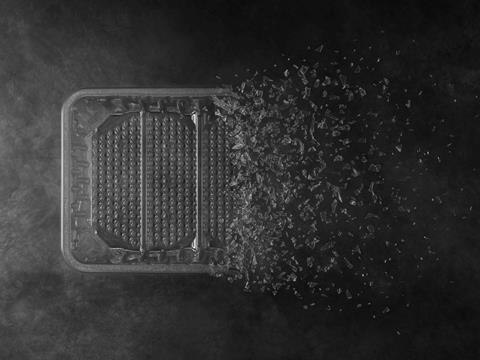
Klöckner Pentaplast (kp) has released what is claimed to be the first food packaging tray composed entirely of recycled tray material, utilizing its Tray2Tray closed-loop initiative to recover PET waste.
Tray2Tray involves the recovery of used food trays, which are then recycled back into more food trays. Through this system, kp aspires to establish a closed loop of ‘safe, protective, fully recyclable’ food packaging – and, by the end of 2025, ensure that at least 30% of recycled material in its packaging will be sourced from Tray2Tray.
As opposed to other food packaging trays that utilize recovered PET material, kp reports that its newly launched tray constitutes 100% rPET derived only from other trays. It is recommended as a solution for businesses looking to advance their ESG strategies and control costs regarding eco-taxes and plastic tax legislation.
According to kp, its supply chain is RecyClass certified, confirming the safety, quality, and traceability of its PCR packaging solutions. Its 100% rPET tray intends to align with its ‘packaging with integrity’ ethos, as well as its goal to establish a ‘more sustainable’ packaging industry without undermining quality or safety.
Thomas Kure Jakobsen, president of Food Packaging at kp, commented: “As a bold innovator, we are thrilled to introduce the first-ever 100% rPET tray to the market.
“This achievement is a major breakthrough in the packaging industry, and perfectly demonstrates what is possible with the right combination of expertise and technology. Most rPET in the material loop comes from plastic bottles, of which just 30% goes into food packaging trays, and most of this does not end up being recovered. As a result, countless tonnes of rPET tray material are wasted each year.
“kp Tray2Tray challenges this by creating a robust closed loop system of PET flake from trays. We work with suppliers to create a separate supply stream of recycled PET from trays, which can be used to create more of the same, rather than being downcycled.”
“We’re not just looking to move the needle on plastic tray sustainability; we’re aiming to begin the next era. One of the biggest advantages of partnering with kp and using kp Tray2Tray content is that it’s a perfect ‘drop in’ solution, so switching over is easy, and packaging performance isn’t compromised.
“Our 100% kp Tray2Tray packaging is a real, workable tray that offers a glimpse into the future of tray packaging circularity.”
Other developments from kp include kp Elite, its certified recyclable modified atmosphere packaging tray made entirely of rPET. In tandem with the Tray2Tray initiative, kp hopes that it can help reduce waste and establish a closed-loop packaging system for protein products.
Moy Park recently adopted kp Elite to package its poultry range. In doing so, the company has targeted a 50-tonne reduction in plastic consumption and a transition into completely mono-material packaging.
Meanwhile, last year’s partnership between Indorama Ventures and AMB Spa sought to keep 150 million post-consumer PET trays out of landfill and incineration by recycling them into films, which would then be applied back to food packaging trays.
If you liked this story, you might also enjoy:
Report: The ultimate guide to global plastic sustainability regulation
The Brief: Oxo-(bio)degradables: the who, what, and why of breaking down fossil-based plastics
Sustainable Packaging Summit: How Kraft-Heinz uses collaboration to drive innovation
The Brief: Using ocean-bound plastic in packaging – how, why and should we?













No comments yet